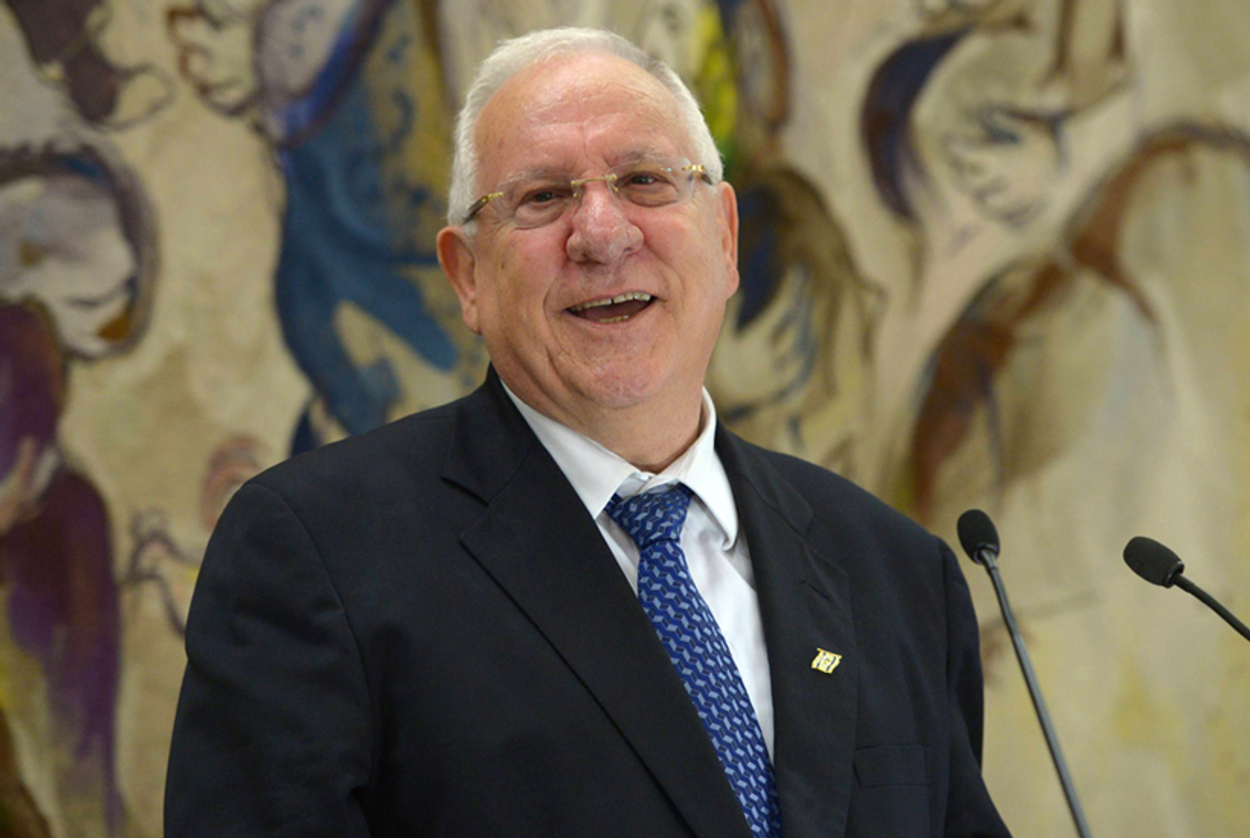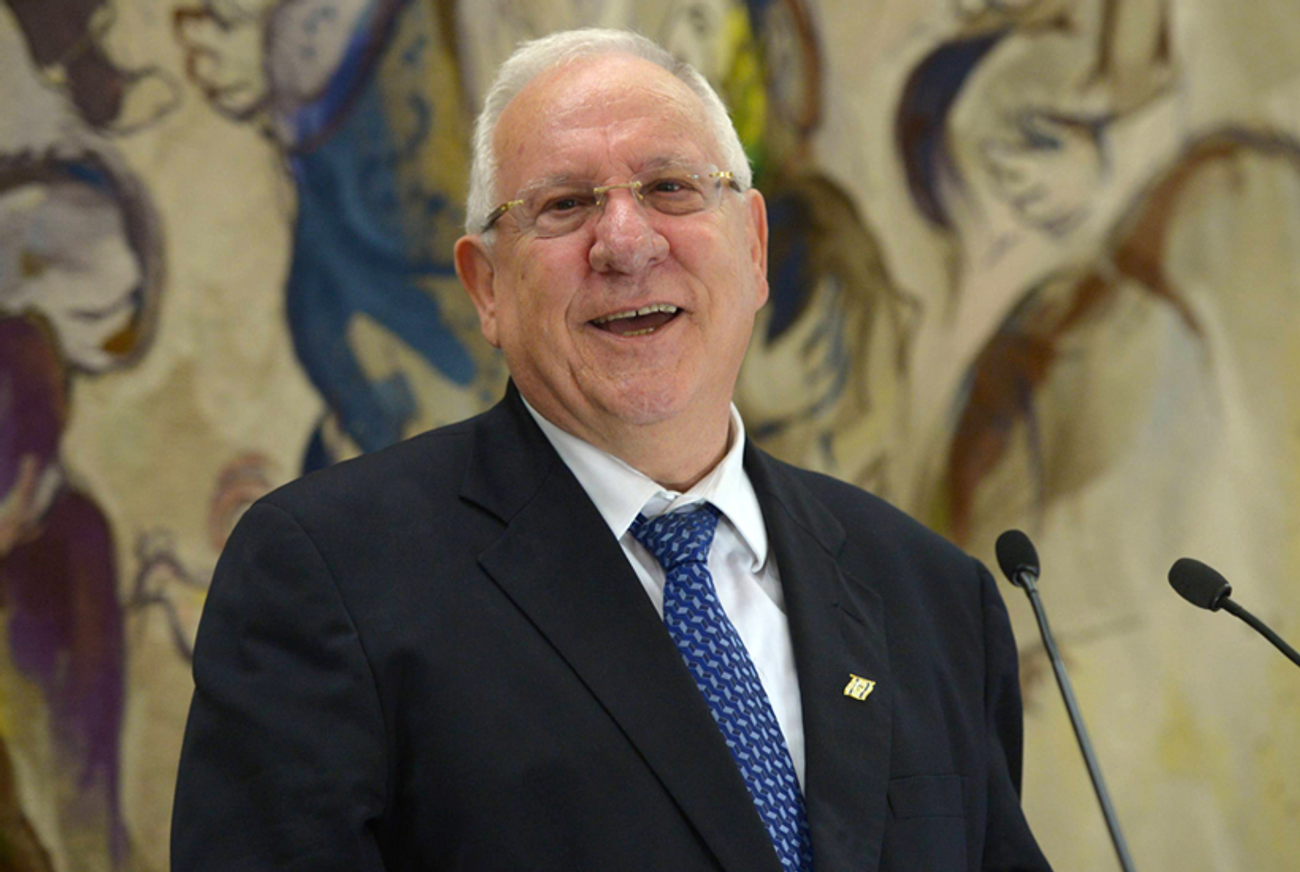We Owe Ruby Rivlin an Apology
Israel’s new president was considered by most in the media to be a hardliner. How did so many get it so wrong for so long?




Prophecy, the Talmud tells us, is a fool’s errand, which means that prophecy criticism—the nasty habit of gleefully calling people out for faulty predictions—occupies an even lower rung of degeneracy. But sometimes corrections are necessary, if only to encourage people to at least try to avoid knee-jerk proclamations driven by ideological blindness to personal animosity.
Both of these were on display when Reuven Rivlin emerged as a serious candidate for Israel’s presidency. Rivlin, the seers said at the time, back in the dark ages of five months ago, was a hawk in sheep’s clothing. Akiva Eldar, the ex-columnist for Haaretz, called the support of some on the Israeli left for Rivlin’s candidacy “baffling” and argued that should he be tapped to replace the retiring Shimon Peres and the nation’s First Citizen, Israel will be thrust into a dark era of international isolation. “The president’s residence,” Eldar wrote, “will no longer serve as the main beauty parlor and cosmetics salon for Israel’s right-wing governments.” Eldar’s former employer took a slightly more jocular tone some months earlier, running a profile of the man who would be president with the headline “How Israel Fell for Ruby Rivlin, the Philosopher Clown.” The term wasn’t meant as a compliment. And critics outside of Israel were hardly more forgiving: Rivlin, declared one widely circulated AFP story, was “the affable face of Israel’s far right.” If you didn’t know better, you’d be forgiven for thinking that the reign of Rivlin would be all jackboots and Jewish fanaticism.
Behold, then, President Rivlin, speaking this week in Kfar Kassem, the Israeli Arab village where border guards shot and killed 48 Arab civilians in 1956. The incident remains one of the most shameful moments in Israeli history and is widely taught in schools as a cautionary tale warning against blind obedience to blatantly illegal and immoral orders. Israel, Rivlin said, standing in the shadow of the black obelisk-like monument in the center of the village, must “look straight at what happened in Kfar Kassem and teach all future generations about it,” as “a serious crime was committed here and needs to be repaired.” Nor, Rivlin stressed, were Israel’s iniquities limited to the past: The Jewish state, he plainly admitted, “needs to be honest and admit that the Arab sector in Israel has suffered from years of discrimination,” and that even today “many Arabs in Israel are faced with racism from Jews.” It was the first time any Israeli president had attended the memorial, a historic visit Rivlin concluded by laying a wreath by the slab commemorating the names of the deceased.
It wasn’t Rivlin’s first attempt at reconciliation. Earlier this month, the president, like many in Israel, was moved by a short video posted by an 11-year-old Israeli student named George Amira. In the video, Amira held up signs displaying some of the slurs he’d been subject to in school; Rivlin summoned the child to the president’s office to shoot a sequel, condemning “violence, hostility, bullying, and racism.” It was released a few days before Yom Kippur.
It’s common, of course, for elected officials to change their tune once they take office, abandoning the fiery talk of the campaign trail for milder, more inclusive stuff. That’s not the case with Rivlin. In his previous role as the speaker of the Knesset, he has had several opportunities to demonstrate his commitment to defending the vibrancy of Israeli democracy. When 39 rabbis on official municipal payrolls wrote a public letter in 2010 calling on Jews not to rent their apartments to Arabs, Rivlin thundered that the letter “damages the foundations of the State of Israel” and “shames the Jewish people.” His actions were as steely as his words: When MK Haneen Zoabi returned from participating in the notorious Gaza flotilla that same year, Rivlin stood firm in his refusal to adhere to the demands of many of Zoabi’s colleagues and remove her from the Knesset.
How, then, could so many have missed this fundamental aspect of Rivlin’s worldview? Why have so many observers, some more astute than others, reduced him to a joker at best and, at worst, a zealot? In part, it’s yet another manifestation of the well-documented tradition of reporters getting Israel terribly wrong. But there’s something deeper at play: Like Israel at large, Rivlin is the canary in coalmine of conformity.
It’s a bad trip, one that Ralph Waldo Emerson, in one of his more illuminated moments, defined perfectly. “A man must consider what a blindman’s-buff is this game of conformity,” he wrote. “If I know your sect, I anticipate your argument. I hear a preacher announce for his text and topic the expediency of one of the institutions of his church. Do I not know beforehand that not possibly can he say a new and spontaneous word? Do I not know that, with all this ostentation of examining the grounds of the institution, he will do no such thing? Do I not know that he is pledged to himself not to look but at one side,—the permitted side, not as a man, but as a parish minister?” It requires, Emerson concluded, “the habit and magnanimity of religion” to keep such small-mindedness from corroding one’s faith in mankind.
Thankfully, Rivlin seems to possess both. The rest of us may not be so lucky. It is dispiriting to see so many pundits opine without regard for Rivlin’s legislative record and ideological roots—his is a firm commitment to Ze’ev Jabotinsky’s teachings, which stressed in equal measure a dedication to the land of Israel and to the values of liberal democracy. But it is infuriating to know that beneath this thin veneer of ignorance lies a deeper Manichean mindset, one for which a passionate Zionist can no more be a tireless defender of civil liberties than a bull can work the showroom of his neighborhood china shop.
This love of lazy dichotomies burns brightest when it comes to Israel, but it is everywhere in evidence. With only days to go before the midterm elections, for example, some in the media still peddle the story about the Republicans’ so-called war on women, even as more and more real women, particularly in battleground states, are leaning red. If you possess a binary mind for which the only two settings possible are either and or, such developments are as baffling as the hardened Likudnik traveling to Kfar Kassem to express his sincere regrets. Most of us, thankfully, are smarter than that. We understand that people, to borrow a few phrases from another great American mind, contain multitudes: We are stuffed with the stuff that is coarse, and stuffed with the stuff that is fine, and if you choose to write about us you mustn’t reduce us to smallish particles or cling to one part of our person and insist that it represents the whole. You must understand that none of us are the face—affable or otherwise—of anything but ourselves. We are not the voice of a generation or the embodiment of an idea. In large part, that’s because ideas—like generations, or political platforms, or any number of complex abstractions—aren’t corporeal. They, too, contain multitudes, and they, too, resist conformity. We have no choice but to treat them with the respect they deserve, and a fine guide on this rigorous intellectual and moral undertaking is Ruby Rivlin.
***
Like this article? Sign up for our Daily Digest to get Tablet Magazine’s new content in your inbox each morning.
Liel Leibovitz is a senior writer for Tablet Magazine and a host of the Unorthodox podcast.
Liel Leibovitz is editor-at-large for Tablet Magazine and a host of its weekly culture podcast Unorthodox and daily Talmud podcast Take One. He is the editor of Zionism: The Tablet Guide.